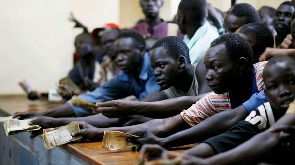The Bank of South Sudan (BoSS) has moved to curtail the operations of informal foreign exchange dealers as part of the World Bank-funded financial sector modernisation and reform plan.
The aim is to terminate parallel forex markets, rein in money laundering activities, and address the banking sector’s weaknesses and vulnerabilities.
Parallel foreign exchange markets have largely been blamed for fuelling currency speculation and hyperinflation thereby increasing the cost of living in the country and causing foreign banks operating in Juba to post monetary losses.
Under the reform plan which is being pushed by the newly appointed Governor James Alic Garang, informal forex dealers are required to form umbrella associations or organise themselves into structured groups.
They are to operate in permanent structures from designated locations, apply for registration from the central bank, and pay taxes to the government.
“These measures are geared towards streamlining the FX trading while mitigating the related currency risks,” said Dr Garang in a statement.
“All these steps will eventually allow the Bank to gather credible and reliable statistics and data to formalize unauthorized dealers into the mainstream FX market.”
The South Sudanese Pound (SSP) lost 74 percent of its value to trade at 1,067 units against the dollar on December 12 from a high of SSP 613.35 on November 11, 2022.
In fiscal year (2019/2020), South Sudan’s exchange rate was massively overvalued with the official rate at SSP 161 to the dollar while the parallel market rate stood at SSP 306 to the dollar.
The regulator said in a statement posted on its website on December 1 that the restructuring of the foreign exchange market will be implemented in three phases.
The initial phase allows unauthorised dealers to operate in the open, under shades, or under an umbrella for a period of 10 days up to December 14 after which every unauthorized dealer will be expected to operate under a distinct structure.
In the second phase, the unauthorised dealers will be required to form groups or associations as they await further directives from the BoSS and obtain licenses to operate as foreign exchange bureaus.
The final phase will require anyone intending to engage in forex trading to do so inside a shop and possess a license to operate, issue receipts, and pay taxes.
“The Bank of South Sudan will engage other stakeholders, including Juba City Council and law enforcement agencies, to curb and apply the full force of the law to non-compliance market participants,” said Garang.
“Upon the implementation of this deliberate re-organisation of the informal FX traders, the Bank will roll out a comprehensive policy to streamline such activities along the existing regulations and guidelines.”
Ruthless efficiency:
Currency depreciation or appreciation is one of the macroeconomic indicators of economic stability of a nation and the relationship between exchange rate movement and local prices is central for economic stability.
President Salva Kiir appointed Dr. Garang, an economist and former advisor at the IMF, as central bank governor in October to help stabilise the economy and preserve the value of the currency.
This followed the sacking of the immediate former governor Johnny Ohisa Damian together with his two deputy governors, marking the sixth central bank boss to be fired in the past seven years, or since January 2017.
South Sudan’s ongoing financial sector reform project is financed through a grant of $18 million from the World Bank’s International Development Association.
The five-year project seeks to strengthen the capacity of the BoSS to deal with financial sector challenges, address the weaknesses and vulnerabilities in South Sudan’s banking sector, and strengthen the Financial Intelligence Unit (FIU) to combat money laundering and terrorism financing to maintain the integrity of the financial system.
Implementation of a fully functional and independent FIU is one of the commitments BoSS has made to strengthen its Anti-Money Laundering and Combating the Financing of Terrorism regime in compliance with international standards.
Restoring confidence:
BoSS is tightening restrictions on the use of the dollar in the economy to stem capital outflows and shore up the dilapidated forex reserves.
The IMF is exerting pressure on Juba to institute key economic, governance, and financial reforms to restore investor confidence and repair the country’s tattered relations with donors.
The reforms which if implemented could restore the credibility of the war-torn nation on the global scene include the elimination of widespread corruption in the civil service, strengthening of the financial sector, and strengthening the legislation to combat money laundering and terrorist financing.
Others are strengthening the debt management framework and expenditure controls, improving the Public Finance Management framework, and implementing a Public Procurement and Disposal Authority to improve the management of resources.
“There are many drawbacks from excessive use of foreign currency in an economy… It is, therefore, important to reiterate that the central bank will step up this policy and co-ordinate with other relevant government agencies, including law enforcement agencies, to enforce the legal tender circular,” said Garang.
In February, the South Sudan government suspended the use of the US dollar in the economy and directed all transactions to be completed in the local currency, the SSP.
The regulator is also committed to improving banking supervision and financial inclusion through the recapitalisation of the banking sector and the creation of a deposit insurance scheme to cushion bank customers in the event of bank failures.
Africa News of Monday, 18 December 2023
Source: theeastafrican.co.ke

















